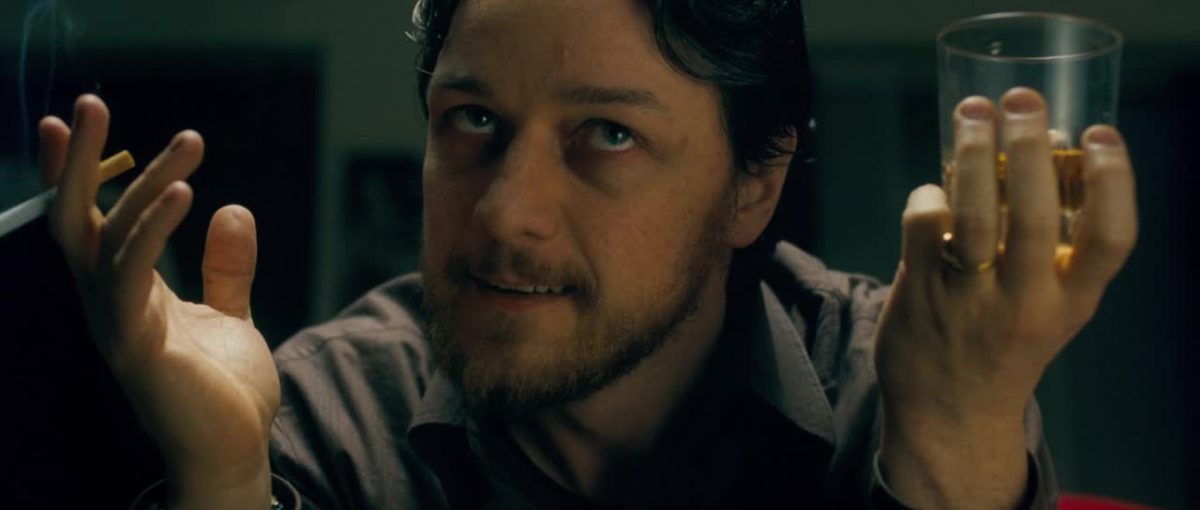 (3.5 / 5)
(3.5 / 5)
The medical standard for Irvine Welsh adaptations is undoubtedly still Trainspotting, made back in the midst of the Britpop era (1996).
Since there have been two further attempts to bring his works to the bring screen – The Acid House and the explicitly titled Irvine Welsh’s Ecstasy – but, as with Chuck Palahuik and Fight Club, no one’s been able to recapture the magic. Filth, at least, comes close.
The second film of director Jon S. Baird, a filmmaker so little-known he doesn’t even rate his own page on Wikipedia, Filth follows the machinations of Detective Sergeant Bruce Robertson (James McAvoy) of the Edinburgh constabulary as he works his way up the slippery rungs of the ladder towards promotion. The rungs are greased with sex, drugs, booze, and chip dinners.
Aside from recapturing Irvine’s droll, profane humor – Robertson’s asides are an especial treat – but it’s McAvoy’s barnstorming performance that drives the film. Foul-mouthed and self-aggrandizing, Robertson would be a hard man to like were he not quite so engaging. However, though Bruce may see himself as a modern-day Macbeth, he’s little more than a pathetic, broken man.
Between queasy grins and maniacal laughter, McAvoy manages to wring the pathos out of Robertson as he falls ever further into degradation: a scene where Bruce desperately attempts self abuse during an obscene phone call as his victim laughs at him is particularly harrowing. The film certainly lives up to its title in this regard – suffice to say, you’ll walk out feeling more than a little sordid.
Though McAvoy may be the headliner, there’s solid support from an eclectic cast including Jamie Bell’s charlie-loving copper Ray and Eddie Marsan as the speccy, savannah-obsessed “best mate”. They’re very much types, ineptly maneuvered chess pieces on Robertson’s path to success (to throw in a few more advancement metaphors), but their presence certainly helps bring Filth to life.
The presence of Dr. Rossi (Jim Broadbent), however, a psychiatrist who becomes an imp of Robertson’s psyche, serves mostly to provide hallucinatory exposition on Bruce’s tragic past, but also neatly exposes the film’s subtext: beneath all the success, Filth is about a man who embraces all the nastiness the world has to offer as a refuge against deep and inescapable emotional pain.
DS Bruce Robertson is such a magnificent train wreck of a character, it’s no surprise that the film, like him, goes off the rails in the third act. As his personality disintegrates so does the film that showcases it. Strangely enough, in this regard Filth resembles Blue Jasmine, which featured a similarly devastating performance from Cate Blanchett, albeit without all the snorting and romping.
John Sessions also stars as Toal, Roberton’s traditionalist boss, out of his depth in this new PC world, with Brian McArdle, Gary Lewis, Emun Elliott, and Imogen Poots as Bruce’s competitors for promotion, while Shauna MacDonald plays the missus and Joanne Froggatt the would-be light at the end of the tunnel. Even so, this is very much Bruce’s story.
Unruly and unpredictable, vivid and bizarre, Filth can be overwhelming, but its nevertheless deeply funny, occasionally touching, and well worth subjecting yourself to. McAvoy turns in the film’s title role without vanity, revealing Bruce’s humanity beneath the monstrous shell. Let’s see if Dom Hemingway can do the same for Jude Law.
